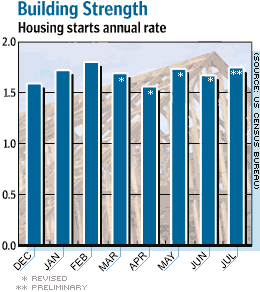NEW YORK (CNN/Money) - Construction starts on new homes in the United States fell in July for the second straight month, the government said Friday, as the red-hot housing market continued to cool off.
The Commerce Department said housing starts fell 2.7 percent to a seasonally adjusted annual rate of 1.649 million units after falling a revised 2.7 percent in June. Economists, on average, expected housing starts to rise to a 1.678 million-unit pace, according to Briefing.com.
Building permits, a more leading indicator of demand for new homes, fell 0.5 percent in July to an annual rate of 1.698 million units from a revised 1.7 million in June. Economists expected permits to fall to a 1.68 million-unit rate, according to Briefing.com.
In a separate report, the Labor Department said its consumer price index, a measure of consumer inflation, rose a timid 0.1 percent in July. Excluding food and energy prices, "core" CPI rose 0.2 percent.

The reports had little effect on U.S. stock market futures, which traded lower, pointing to a negative opening on Wall Street. Treasury bond prices rose.
The housing market has been one of the few pillars of strength in an economy that sank into recession in March 2001.
Persistently low mortgage rates fueled demand for homes, driving prices higher and helping many Americans feel wealthier, despite falling stock prices. Low mortgage rates also encouraged many consumers to refinance their homes, putting more cash in their pockets.
The housing market has been so red-hot, in fact, that some economists have worried that home prices are in a bubble similar to the stock-price bubble of the late 1990s.
Most analysts, however, so far have dismissed that idea, pointing to low inventory of available homes and the prospect of continuing low mortgage rates as factors supporting a strong housing market for months to come.
According to mortgage security firm Freddie Mac (FRE: Research, Estimates), the average rate on a 30-year fixed-rate mortgage dropped this week to 6.22 percent, an all-time low.
Consumer spending is crucial to the broader economy, since it makes up about two-thirds of U.S. gross domestic product (GDP), the broadest measure of the economy.
In the Commerce Department report, starts of single-family homes fell 2.2 percent to a 1.321 million-unit pace, while starts of apartment buildings with 5 or more units rose 1.0 percent to a 301,000-unit pace.
Construction permits for single-family homes fell 1.4 percent to a 1.275 million-unit pace, while permits for apartment buildings rose 5.4 percent to a 349,000-unit pace.

|

